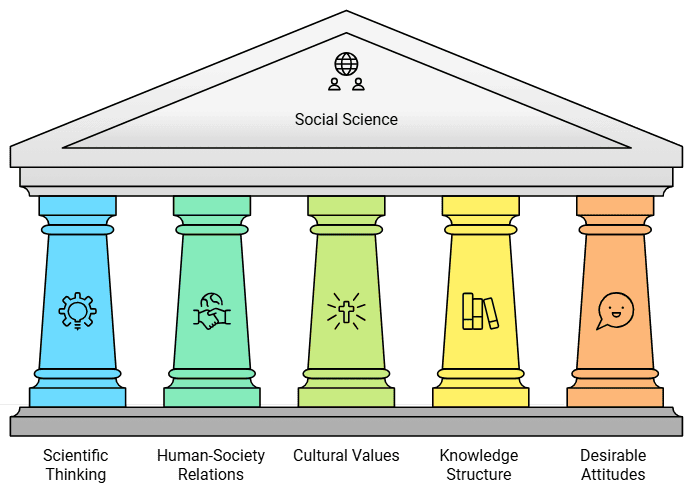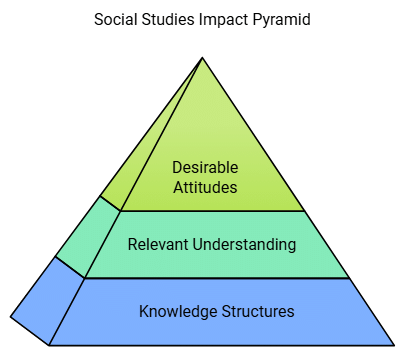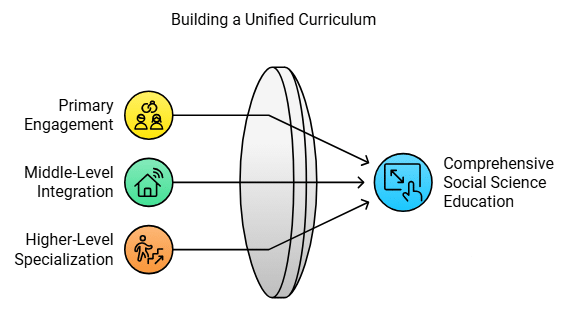Notes: Concept & Nature of Social Science/Social Studies | Social Studies & Pedagogy Paper 2 for CTET & TET Exams - CTET & State TET PDF Download
The concept and nature of social science is a dynamic which includes the scientific or logical thinking in teaching-learning process of social science. Social science is the scientific study of human and its relation with the society. The purpose of teaching and learning social science is to attain the objective and relation with society, cultural and values among the learners. Social science develops the knowledge structure, relevant understanding and also develops desirable attitudes in learners.

Social Science
- Conceptual Meaning: Social study refers to the comprehensive study of society, encompassing various aspects such as economics, religion, politics, and culture.
- Nature of Social Science: Initially, social science was merely descriptive, lacking emphasis on scientific methods or logical analysis. However, with the evolution of scientific thinking in teaching-learning processes, social science has become more analytical and systematic.
- Combination of Art and Science: Modern social study is considered a blend of both art and science. While its subject matter revolves around societal issues, its methodology incorporates scientific principles.
Concept of Social Study or Science
- Historical Evolution: Initially, social subjects were integrated within the realm of history. Over time, various branches of social study emerged, including history, geography, civics, economics, and sociology.
- Interdisciplinary Nature: Presently, social study is viewed as correlated with science, with different branches of study interlinked. It encompasses elements from history, geography, civics, economics, and sociology, among others.

Relation of Social Science with Other Subjects
Language and Literature: Language serves as the medium through which literature, such as essays, poems, and stories, reflects the contemporary society. It's often said that literature is a reflection of society itself.
Mathematics and Other Sciences: Mathematics is essential in determining chronology in history, studying geographical phenomena, and understanding economic principles. Science and technology, including devices like radios, computers, TVs, and mobile phones, directly influence social life, indicating the close relationship between social studies and other scientific disciplines.
Art: Social studies also intersects with art as it involves the study of art, sculpture, and paintings of different societies.

Contribution of Social Studies to Development of Children
- Development of Knowledge Structures: Social studies provides content that helps in developing factual knowledge about human beings and their environment within a specific time-space context.
- Development of Relevant Understanding: Teachers play a crucial role in ensuring that students understand the organized set of facts presented in social studies. Encouraging related experiences inside and outside the classroom aids in this understanding.
- Development of Desirable Attitudes: Social studies not only imparts facts but also helps in shaping desirable attitudes in children. Teachers influence this by demonstrating proper attitudes through their behavior.
Teaching Method of Social Studies
Social studies can be taught using various methods, including:
- Simple to Complex: This method emphasizes proceeding from simple concepts to complex ones, suitable for primary and middle levels.
- Known to Unknown: Known facts are introduced first, followed by exploration of unknown concepts.
- Specific to General: Concepts are introduced with specific examples, leading to the evolution of generalized terms or concepts. This method is suitable for higher levels.

National Education Policy and Teaching of Social Studies
Education policies, primarily formulated by the Central Government, aim to ensure uniformity and quality in education. Social studies plays a crucial role in achieving the objectives outlined in such policies.
National Education Policy, 1986: Formulated in 1986 and modified in 1992, this policy aimed to bring uniformity in education, promote adult education, ensure education for all while maintaining quality, emphasize girls' education, establish Navodaya Vidyalayas in every district, make middle education vocational, and consolidate All India Technical Education along with emphasizing physical education.
Education Without Burden, 1993
The Ministry of Human Resource Development established a National Advisory Committee in March 1992 to address educational issues, particularly the burden on students. The committee, chaired by Yashpal, produced the report titled "Learning Without Burden" in 1993.
The report extensively discussed the burden on children and the physical strain caused by heavy school bags. It recommended developing lifelong self-learning capabilities and skills to enhance the quality of education. Subjects like social studies and language, often perceived as tedious due to their extensive content, were suggested to be taught using audio-visual aids and linked with learners' daily lives.
National Curriculum Framework, 2005
The National Curriculum Framework of 2005 prioritizes child-centered education and aims to facilitate learning without burden. It advocates for eliminating gender and caste-based stereotypes and encourages innovative teaching methods. The framework emphasizes connecting knowledge to real-life situations, moving away from rote learning, and empowering students to frame questions themselves.
Teachers play a vital role in implementing this framework by challenging students to think critically. However, the document acknowledges the need for teacher education reform to support curriculum renewal. The National Council for Teacher Education (NCTE), responsible for regulating teacher education, has endorsed the NCF 2005 and agreed to restructure B.Ed. programs accordingly.

Planning of Social Science Curriculum at Different Levels
- At Primary Level: The primary social science curriculum should engage children in activities that help them understand their environment through illustrations from physical, biological, social, and cultural spheres. Teaching should be participative and discussion-oriented.
- At Middle Level: Social science curriculum at the middle level should incorporate the subjects of history, geography, sociology, political science, and economics. It should address the social and economic challenges of contemporary India and relate content to students' everyday lives.
- At Higher Level: At higher levels, where subjects become a matter of choice and students often opt for job-oriented vocational courses, the social science curriculum should provide basic knowledge and skills relevant to their chosen field.
|
75 videos|320 docs|78 tests
|
FAQs on Notes: Concept & Nature of Social Science/Social Studies - Social Studies & Pedagogy Paper 2 for CTET & TET Exams - CTET & State TET
| 1. What is the relationship between social science and other subjects? |  |
| 2. How does social studies contribute to the development of children? |  |
| 3. What are effective teaching methods for social studies? |  |
| 4. How does the National Education Policy impact the teaching of social studies? |  |
| 5. What is the concept and nature of social science/social studies? |  |

















